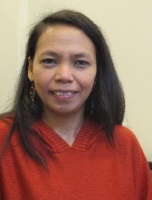Biography
Cynthia Embido Bejeno is a PhD researcher at the International Institute of Social Studies, Erasmus University and currently works on the project, “On the Frontlines: Peasant Women Struggles on Land Reform in the Philippines”. Prior to this project, she used to be a development practitioner and involved in various non-governmental organizations that aim to advance peoples’ rights and societal transformation in the Philippines. She was involved and led various national organizations and development projects and intervention in and with various groups and communities, amongst others. She was involved in organizing peasants, women, and other marginalized groups that engaged the government towards advancement of land reform, women’s empowerment, good governance, sustainable development, climate justice, amongst others. At ISS, while doing her PhD, she actively represented the PhD community in various bodies, such as RDC, IC, Graduate School, and coordinated Development Dialogues’ conferences, amongst others.
Research gate: https://www.researchgate.net/profile/Cynthia-Bejeno
Abstract
Integrated justice approach to land reform
The unjust (re)distribution of resources (in this case land) between and amongst classes and gender persists. The use of justice lens is explored here to better understand and contribute to the intervention on land reform, especially the gender justice on land which is oftentimes neglected and hardly advanced by the state, the social movement, and even by the women’s movement. For instance, in the Philippines, while peasant women lead and take the frontline roles in advancing land, however, the women’s strategic gender interests are often neglected and overshadowed by class-based concerns. Hence, an integrated approach to understanding gender injustice on land is found useful. This paper argues that the class and gender-based land injustice are interconnectedly shaped by economic maldistribution, cultural misrecognition, and political misrepresentat ion. Thus, land question requires analyses and interventions that integrate the economic, cultural, and political aspects of justice or the so-called integrated justice approach. This integrated justice approach becomes more relevant considering the on-going agrarian structure (such as in the Philippines), which is often marred by violence from the opposing landlords and lack of political will from the agrarian program enforcers, operating through an outdated set of gendered norms and values.
Reflecting on the peasant women’s struggles for land entitlement through the Comprehensive Agrarian Reform Program (CARP) in the country, the two case studies, SAMFAI and KMPCI, demonstrate the visibility and invisibility, the voices and silences, and the possibilities and constraints towards gender justice on land. Meanwhile, peasant women’ assertions on land rights has influenced the ‘success’ of land reform struggle and created some positive changes in policy, patriarchal norms and practices, women’s rights awareness and leadership, and livelihood, amongst others. In many ways, these have paved the way towards gender-just Philippine society, however, the challenges to eliminate the continuities of certain gender norms and practices in land reform and the society in general remains. Ultimately, a gender lens becomes crucial in the theory and prac tice in the land reform processes if the aim is to effect change and achieve gender justice in land.
This article aims at contributing to understanding land (in)justice, highlighting gender (in)justice, especially given its marginal position in the on- going agrarian discourse, and its importance. In so doing, I explore Nancy Fraser’s theory on justice. This paper argues that the on-going land and gender injustice on land are shaped by the on-going economic maldistribution, cultural misrecognition, and political misrepresentation.
The article will be organized as follows: first, discussion on the concepts of justice and gender justice, which are crucial building blocks in my argument. The second part discusses Fraser’s integrated approach to justice, which informs the analysis of this article. The third part discusses the class and gender-based land injustice and the underlying structures, using the three-dimensions of land (in)justice. And finally, the article concludes
by discussing the potential implications for research, policy, and practice.
Affiliation: International Institute of Social Studies, Netherlands

